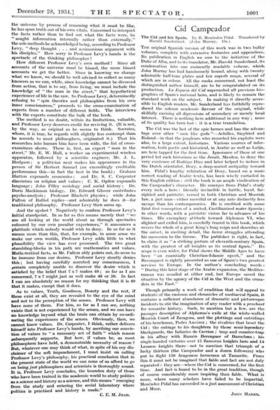Cid Campeador
The Cid and his Spain. By B. Menendez Pidal. Translated by Harold Sunderland. (John Murray. 148.) THE original Spanish version of this work was in two bulky volumes, complete with extensive footnotes and appendices. Its publication in English we owe to the initiative of the Duke of Alba, and to its translator, Mr. Harold Sunderland, its condensation into one eminently readable volume, which John Murray has had handsomely bound, along with twenty admirable half-tone plates and ten superb maps, several of which are in colour. All the cooks concerned, not least the distinguished author himself, are to be congratulated on its production. La Esparta del Cid superseded all previous bio- graphies of Spain's national hero, and is likely to remain the standard work on the subject. In making it directly acces- sible to English readers, Mr. Sunderland has faithfully repro- duced the solemn academic flavour of the original, while skilfully excising all digressions of secondary or merely local interest. There is nothing here additional in any way ; none of its quality has been lost : it is a true translation.
The Cid was the last of the epic heroes and has the advan- tage over other " men like gods "—Achilles, Siegfried and Roland—in that the jongleurs who recorded his exploits were also, to a large extent, historians. Various sources of infor- mation, both poetic and historical, in Arabic as well as Latin, are here tapped for the first time. Ignorance of these at one period led such historians as the Jesuit, Masdeu, to deny the very existence of Rodrigo Diaz and later helped to induce in the Dutch orientalist, Dozy, a deep-seated antipathy toward him. Pidal's lengthy refutation of Dozy, based on a more correct reading of Arabic texts, has been wisely curtailed in this English edition : still the book is an ample vindication of the Campeador's character. He emerges from Pidal's study every inch a hero : literally invincible in battle, loyal, far- sighted and patriotic, versed in both Christian and Moorish law, a just man—either merciful or at any rate distinctly less savage than his contemporaries. Ile is credited with some faint first conception of a united, Castilianized mater Spania ; in other words, with a patriotic vision far in advance of his times. His exemplary attitude toward Alphonso VI, who slighted and exiled him, is carefully traced in this book, which covers the whole of a great King's long reign and describes at the outset, in exciting detail, the fierce struggles attending his succession to the throne. The publisher is right, in fact, to claim it as " a striking picture of eleventh-century Spain, with the greatest of all knights as its central figure." Its scope is even wider, for Pidal shows the Middle Ages to have been " an essentially Christian-Islamic epoch," and the Reconquest is rightly presented as one of Spain's two greatest services to Europe. In the author's concluding words : " During this later stage of the Arabic expansion, the Mediter- ranean was assailed at either end, but Europe saved the situation by the agency of the Cid in the West and the crusa- ders in the East."
Though primarily a work of erudition that will appeal to students of the customs and chronicles of mediaeval Spain, it contains a sufficient abundance of dramatic and picturesque incidents to stir the imagination of any reader with a penchant for romantic history. Such, to mention but a few, are the passages descriptive of Alphonso's exile at the white-walled Moorish Court of Zaragoza, and the plottbigs and outridings of his henchman, Pedro Ansiirez ; the rivalries that beset the Cid ; the outrage to his daughters by those semi-legendary blackguards, the Infantes de Carrion ; trap and counter-trap in his affray. with Ramtin .Berenguer of Barcelona ; his single-handed victories over 15 Zamoran knights here and 14 Leonese knights there—not to mention that triumph of a lucky thirteen (the Campeador and a dozen followers) who put to flight 150 Aragonese horsemen at Tamarite. From this it must not be imagined that fable and fact are not duly separated : they are—where the Cid is concerned, for the first time. And fact is found to be in the great tradition, though of course considerably more inspiring than fable. What is more, where many scholars have failed to be impartial, Menendez Pidal has succeeded in a just assessment of Christian and Moor.
Jour; Krauts.


































 Previous page
Previous page